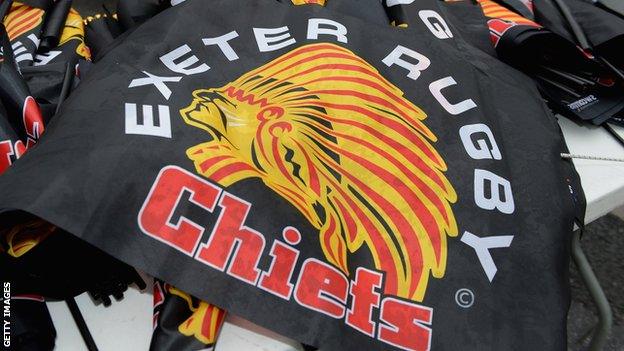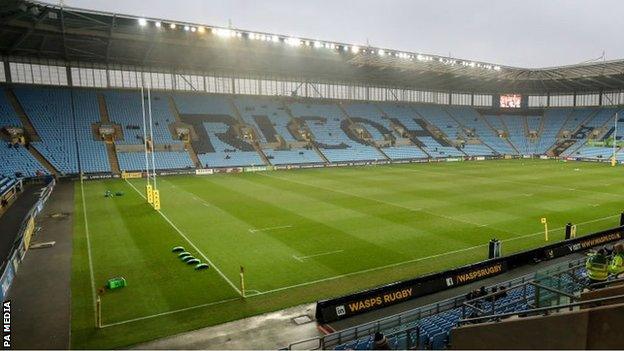Premiership club Wasps ask rugby bosses for 'headdress' steer for Exeter Chiefs game
- Published

Exeter first rebranded themselves as the Chiefs in 1999
Wasps have asked rugby union bosses to decide on the acceptability of Exeter fans wearing Native American-style headdresses with the Chiefs set to visit in the Premiership on Saturday.
Responding to an open letter written by one of their own fans' groups, the Coventry club have not imposed any ban.
But they are discouraging Chiefs fans from wearing headdresses "because they have the potential to cause offence".
Wasps have now asked Premiership Rugby to make a ruling.
They have also approached the Rugby Football Union and its newly-formed Diversity and Inclusion working group to request that "this issue is formally addressed".
Some Chiefs fans have worn the headdresses since the club first rebranded as the Chiefs in 1999.
Following calls from some of their own fans to lose their Native American branding in 2020 after a petition signed by more than 3,700 people, Exeter opted to retain their name and logo but to retire their 'Big Chief' mascot.
An RFU spokesperson said: "The RFU encourages all clubs to carefully consider their role in continuing to improve diversity and inclusion.
"Fan wear is a decision for each individual club and we would actively encourage clubs to engage with their fans and help provide historical context and education so that fans can make informed choices."
'Respect for all cultures crucial'
Saturday is the first time since Covid restrictions that Wasps will have hosted Exeter in front of fans in Coventry. In the lead up to the game Wasps said they were "asked by one of our supporter groups to review the wearing of faux Native American headdresses and other cultural signifiers."
The club statement added: "We have found it difficult to know how best to deal with this issue, which is why we have taken time to consult those more knowledgeable about this subject, including a number of external stakeholders and members of the Native American community.
"Recent events such as the Black Lives Matter movement, the continued racist abuse aimed at high profile sports stars and rising intolerance towards LGBTQ+ people have made it clear that diversity and inclusion are not just political issues, they are human ones.
Allow X content?
This article contains content provided by X. We ask for your permission before anything is loaded, as they may be using cookies and other technologies. You may want to read X’s cookie policy, external and privacy policy, external before accepting. To view this content choose ‘accept and continue’.
"Since 2020, several sports teams around the world have recognised that the appropriation of another culture is something they can no longer justify.
"Last year there was a public focus on the prominent use of appropriated names and iconography by professional franchises including the Washington Football Team [formerly known as the 'Redskins' until July 2020] and in Canada, the Edmonton Eskimos have become the Edmonton Elks.
"Respect for all cultures is crucial. 'The act of taking or using things from a culture that is not your own, especially without showing that you understand or respect this culture' has the potential to cause offence.

Wasps have now been playing in Coventry for seven years
"We will not be issuing an arena wide ban on the wearing of faux Native American attire. One club acting in isolation has the potential to cause further division and uncertainty. However, we do not support the wearing of such items, discourage supporters from wearing them and will be revisiting this decision in due course."